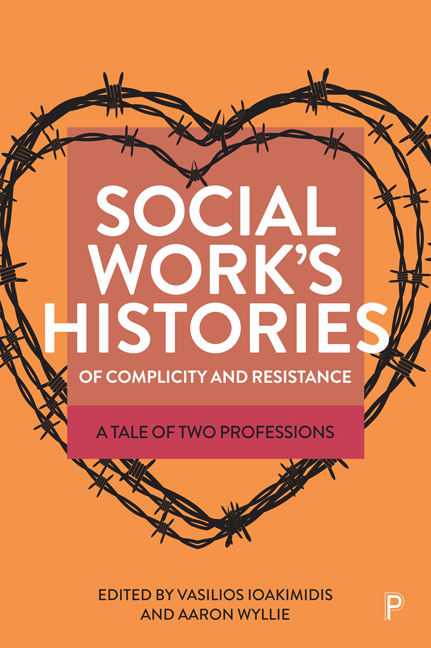Book contents
- Frontmatter
- Contents
- Notes on contributors
- Acknowledgements
- Preface
- Part I Making amends with the past
- Part II Legacies of colonialism and racism in social work
- Part III Social work’s contested ideologies
- Part IV Social work’s complicity with institutionalisation and detention
- Part V Survivor perspectives and contemporary reflections
- Index
2 - Canadian social work and the Sixties Scoop: reflections on the past, lessons for today
Published online by Cambridge University Press: 20 January 2024
- Frontmatter
- Contents
- Notes on contributors
- Acknowledgements
- Preface
- Part I Making amends with the past
- Part II Legacies of colonialism and racism in social work
- Part III Social work’s contested ideologies
- Part IV Social work’s complicity with institutionalisation and detention
- Part V Survivor perspectives and contemporary reflections
- Index
Summary
Introduction
Social work's troubled past with Indigenous peoples in Canada represents one of the profession's darkest moments in the 20th century: a chapter that started with the residential schools – created to assimilate Indigenous children into Euro-Canadian society – and continued with the Sixties Scoop, which represented the policies and practices adopted to remove Indigenous children from Indigenous communities and to place them in foster care or to be adopted by White families (Nichols, 2017; Ferguson et al, 2018; Ioakimidis and Trimikliniotis, 2020).
In the early 19th century, when the colonial settlement process in Canada intensified, Indigenous peoples were subjugated to British colonial rule through the imposition of a colonial policy called the Indian Act, which aimed to ‘protect’ Indigenous people from European settlers (Shewell, 2002). However, such policy and colonial practices were intended primarily to ‘civilise the Indians’ in the name of Christianisation. This occurred through imposing assimilation strategies and practices, supported by the ideological biases of politicians, administrators and the broader society over the decades (Shewell, 2002).
Such practices of settler colonialism inflicted on Indigenous peoples used child welfare as an approach to solving the ‘Indian Problem’ (Stevenson, 2020). By the late 1940s the social work profession was already playing a direct role in the child welfare system concerning Indigenous children. Social workers became directly involved in the removal of Indigenous children from Indigenous families and communities (Stevenson, 2020).
This chapter sheds light on social work's troubled past with Indigenous peoples in Canada. It aims to discuss such ‘troubled histories’ of complicity, oppression and assimilation in an ongoing process of reconciliation with Indigenous peoples and preservation of social work memory (CASW, 2019; Ioakimidis and Trimikliniotis, 2020).
Actions towards reconciliation
The day of 30 September 2021 marked the first National Day for Truth and Reconciliation in Canada, an annual federal statutory holiday passed into federal law in June 2021 by Bill C-5. The creation of such a national day marked another important step in Canada's journey towards reconciliation with Indigenous people. The creation of a National Day for Truth and Reconciliation was one of the 94 Calls to Action made by the Truth and Reconciliation Commission of Canada (TRC) in its final report, released in 2015 (Truth and Reconciliation Commission of Canada, 2015; Canadian Heritage, 2021).
- Type
- Chapter
- Information
- Social Work's Histories of Complicity and ResistanceA Tale of Two Professions, pp. 31 - 40Publisher: Bristol University PressPrint publication year: 2023

